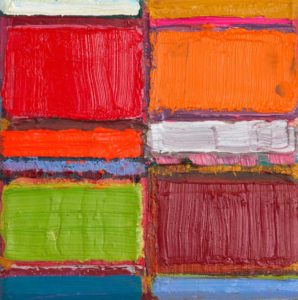
Together, the works speak to the creative act of migration and the potential for everyday objects to simultaneously contain culture, but also cause it to confront other forces surrounding it – namely rapid urban development, technology and the digital economy, which accounts for billions of connections between individuals and multinational companies through mobile devices and data.
Matt Kayem on Tegene Kunbi and Robel Temesgen
Tegene Kunbi and Robel Temesgen: Re:public
Another duo show opened at Circle art gallery last month. This time, it was two Ethiopian mid-career artists, Tegene Kunbi and Robel Temesgen. The show was put together by Wanja Kimani, a visual artist and researcher based in Cambridgeshire, U.K.
Stepping into the white walled space, you are greeted by mostly small objects on the wall, abstract paintings and ink drawings. Although he has worked on large canvases before, Tegene’s miniature works seem to take you back to the 1940s; I can’t help but think of Rothko’s work when I look at the color squares and rectangles. Tegene’s work differs in its employment of the impasto technique with multiple layers and thick paint. Robel’s works on the wall are an interesting cross between painting and drawing as he uses ink, acrylic, permanent marker, Tippex and ink pen which he applies on paper. There is also a few ceramic pots atop pedestals by Robel.
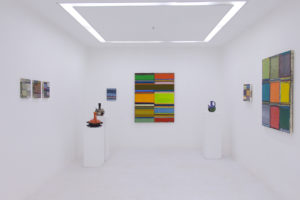
Installation View, Circle Art Gallery, 2019
We are however served with color again but not as vibrant as Evans Mbugua and Dennis Osadebe’s show. The show also delights in the everyday though it’s subtle and less playful in this one. Apart from the obvious difference between the artist’s work which is the figuration and abstraction, the artists seem to agree on one thing – color palette. Their colors are the same, secondary and tertiary mostly and always toned down. Earthy browns, oranges, dirty greens are the artists’ play areas. This should have been Wanja’s stance point when she thought about pairing these two.
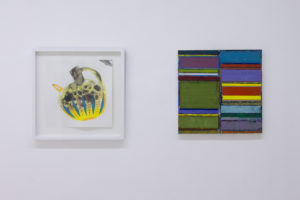
Installation View, Circle Art Gallery, 2019
“What is the point of making a pot if it cannot hold water?” is a question that opens up the exhibition statement. A question that Robel must have asked himself while making the ceramic pieces.
Through painting and ceramic works, Robel Temesgen explores the material quality of jebenas (Ethiopian coffee pots) as a way to interrogate the current socio-political landscape in Ethiopia. Boundaries and dysfunction, control and containment are depicted through delicate paintings and deconstructed ceramics. Taking recognizable motifs from jebenas as a starting point, colors and patterns are distorted and embellished in order to create dreamlike imagery that is at times unrecognizable from their original state. The artist recalls a childhood where the discarding of broken household utensils was rare and “even a potsherd [a broken piece of ceramic] was used to serve water for pets before it was recycled into a new one”. He appreciates their functional quality of making and containing coffee, their material quality of resisting the elements – water and fire – as well as their conceptual quality as carriers of culture. The work presented speaks to tradition and the ever-changing identities that form within a country. The works are a continuation from his Floating Jebenas series, which explored the increasing number of small scale coffee drinking spots around Addis Ababa, which can be found in diverse areas of the city, ranging from the tallest multipurpose malls to parts of the city that have been demolished to make way for new structural developments. These spaces, run by women and familiar in their rituals that include the burning of incense, provide safe environments for open political discussions across generations as well as a place where communal issues are resolved in rural settings. The paintings in the exhibition, often showing jebenas leaning to one side, are the artists’ reflections on the unstable ground Ethiopia finds itself in presently. Rapid urban development, the effects of smart technology and the increase in digital economy leads us to question the transformative position we find ourselves in individually and geopolitically.
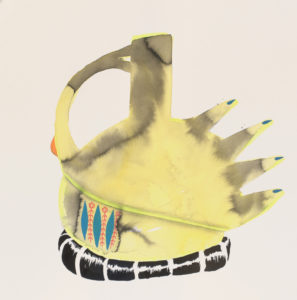
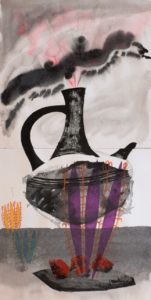
Robel Temesgen, Untitled, 2019/Untitled, 2019
This state of transformation is also explored in Tegene Kunbi’s abstract paintings. Colors are flattened then painted over again and again to create rich textural forms. Blocks of tones from his distinct palette are compartmentalized and reworked, forcing the edges to bleed into each other. At times, this confrontation makes it difficult to differentiate which tone was applied first, hidden and revealed once more. The artist draws on his cultural duality, his migration from Ethiopia to Germany and their respective rituals and rhythms that collide on the canvas. His creative process is evident, with textured marks that reflect the unpredictability in the ebb and flow of assimilation.
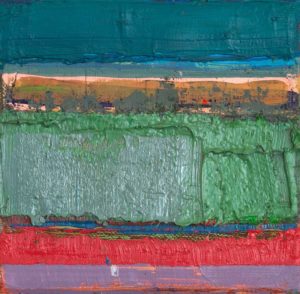
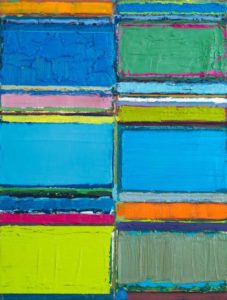
Tegene Kunbi, Untitled, 2018/Untitled, 2019
Together, the works speak to the creative act of migration and the potential for everyday objects to simultaneously contain culture, but also cause it to confront other forces surrounding it – namely rapid urban development, technology and the digital economy, which accounts for billions of connections between individuals and multinational companies through mobile devices and data. The result leads us to question how time changes our position, the values we hold, the choices we make and the tools we may need to reassemble ourselves as individuals and collectively.
